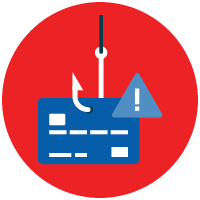
October 2025
5 Ways to Protect Yourself From Online Shopping Scams
You’ve been searching for a popular squishy stuffed animal that’s sold out or on backorder everywhere. Then an ad pops up on Facebook or Instagram offering the toy you’ve been trying to track down. Or maybe the item appears on an auction site with a much lower than expected “buy it now” price. Did you just win the holiday lottery? Probably not.
This could be a non-delivery scam, where you order an item online and your card is charged, but the item never shows up. But it may not end there—often online criminals use your card number and other information to try to steal more of your money or your identity.
The bottom line when it comes to online shopping: When a deal or sale seems too good to be true, it probably is. Here are some other tips from the FBI to help you avoid online holiday scams:
Check company reviews and feedback—When purchasing from a business for the first time, do some research and read the company’s reviews. You can also check with the Better Business Bureau to see if complaints have been filed about the merchant. For online marketplace or auction websites, always check a seller’s feedback rating. Be cautious about sellers with lots of negative feedback or no ratings at all.
Know exactly who you are buying from—Before entering credit card info, check a website’s URL at the top left corner of your screen to make sure it is legitimate and secure. On auction sites, avoid sellers who say they are authorized dealers or factory representatives for popular items in countries where those deals would be unlikely.
How you pay matters—Use a credit card when shopping online, and check your statement or online account often. If you see a suspicious transaction, contact your credit card company to dispute the charge. You can also set up text or email alerts to notify you when your credit card is used. Never wire money directly to a seller or pay for items using prepaid gift cards. These are popular ways for scammers to get your funds. Instead of using a gift card for your payment, criminals will take the money, and you’ll likely never receive the item.
Don’t click unknown links—Never click on suspicious links or attachments in emails or texts or on websites or social media. Criminals try to get you to click on links and then share personal information such as your name, passwords or even bank account numbers.
A new twist on the link scam is when you receive a text with a link to a receipt for something you did not purchase. Another danger of clicking on unknown links is that you could be unknowingly downloading malware to your device. Don’t click the link. Instead, delete the text and block the number from your contacts.
Track your packages—When possible, get tracking numbers for online purchases so you can ensure the items have been shipped and you can follow the delivery process.
Source: Jean Chatzky, savvymoney.com, with reporting by Casandra Andrews
Keep up to date on the latest fraud news by visiting bfcu.org.
Need to report card fraud?
Call 800-647-2328, option 6, or text 318-549-8145. Open Monday – Friday, 8:30am – 5:00pm.
After-hours debit card fraud, call 866-274-2761.
After-hours credit card fraud, call 800-543-5073.
800-647-2328
bfcu.org
Check Rates
Routing: 311175093

